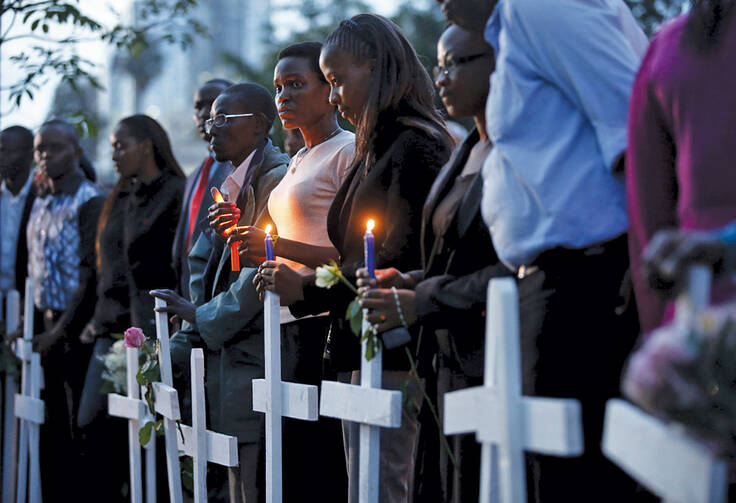Faced with a fierce enemy driven by Islamic extremism, the Kenyan government has cracked down on funding for al-Shabab, the Somali group that claimed responsibility for killing at least 148 mostly Christian students at Garissa University College on April 2. The leader of the Catholic Church in Kenya, Cardinal John Njue, archbishop of Nairobi, condemned the massacre and demanded that Kenyan authorities improve security, but he also urged forgiveness and reconciliation.
Despite fears of further attacks, large numbers of Christians in Garissa and Nairobi attended Easter celebrations, remembering in prayer the young students who were killed. During his homily on Easter Sunday, Cardinal Njue asked worshipers to commit themselves to praying for peace and security. The cardinal called for a global response to terrorism and for national solidarity, admonishing Kenyans not to look at the Garissa massacre through a religious lens.
“We must remain united and not give a few people the impression that this is a war between Christians and Muslims,” he said.
A week after the attack, officials froze the accounts of 85 groups and individuals, including bus companies and Muslim rights organizations, allegedly linked to al-Shabab. The government has closed down one hotel in Eastleigh, a neighborhood in Nairobi commonly known as Little Mogadishu because of its large concentration of ethnic Somalis. But the freeze on Muslims for Human Rights and Haki Africa, two nongovernmental organizations, raised questions, since they are known for their work to improve the lives of Kenyans and fight for the human rights of all citizens.
“I am amazed that these human rights organizations are believed to have been supporting terror,” said Sheikh Juma Ngao, the national chairman of the Kenya Muslim National Advisory Council. “I think the government needs to provide some evidence.”
A statement jointly signed by the Rev. Gabriel Dolan, a Roman Catholic priest and a board member of Muslims for Human Rights, and Sheikh Khelef Khalifa, the board chairman, asks the government to “immediately reconsider” its decision, arguing, “the poor are the people who are going to suffer.”
The group’s board, which is about 60 percent Christian, includes members of all faiths. Hussein Khalid, executive director of Haki Africa, said he was shocked by the government’s action. “We have and will always continue to work...to address matters of human rights and security with the aim of eradicating extremism and radicalization from our midst,” Khalid said.
Meanwhile, the extent of al-Shabab’s outreach in Kenya has raised concerns following reports that schoolchildren were being recruited. At least 40 families in Isiolo County, a strategic gateway between northern and southern Kenya, reported missing children. The families said many disappeared a year ago and may have traveled to al-Shabab’s training camps in Somalia.
In 2013, security agencies identified some high schools in Nairobi whose students were later sent to Somalia or took part in plots to commit crimes in Kenya. Asked about the risk of Kenyan youths becoming radicalized, Cardinal Njue said his “prayer and hope” is that young people can be “well-accompanied” and “never allow themselves to become instruments of destruction.”
The terrorists in the Garissa attack were reportedly Kenyan youth. One of them, Abdirahim Mohammad Abdullahi, was a recent law graduate from the University of Nairobi.
Kenya has been targeted by al-Shabab largely because of its location. It shares a long border with Somalia. In addition, Kenya is one of the biggest contributors to African Union troops in Somalia.








